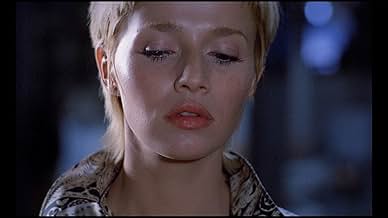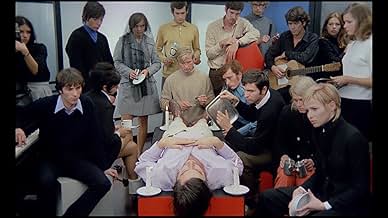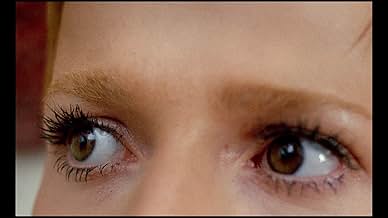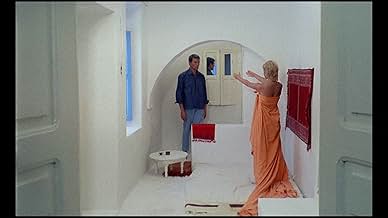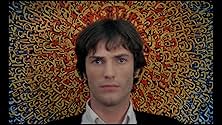IMDb RATING
6.4/10
1.5K
YOUR RATING
A group of French students are drawn into the psychological and sexual games of a mysterious Dutchman. Once they sample his "fear powder" the students experience a series of hallucinations.A group of French students are drawn into the psychological and sexual games of a mysterious Dutchman. Once they sample his "fear powder" the students experience a series of hallucinations.A group of French students are drawn into the psychological and sexual games of a mysterious Dutchman. Once they sample his "fear powder" the students experience a series of hallucinations.
- Director
- Writer
- Stars
- Awards
- 1 nomination total
Jarmila Kolenicová
- Sonia
- (as Jarmila Kolenicova)
Ludovít Króner
- Franc
- (as Ludwik Kroner)
Eva Luther
- Violette's look-a-like
- (uncredited)
- Director
- Writer
- All cast & crew
- Production, box office & more at IMDbPro
Featured reviews
I knew of novelist Alain Robbe-Grillet chiefly by virtue of his script for Alain Resnais’ art-house masterpiece LAST YEAR IN MARIENBAD (1961; which I intend to revisit in tribute to the author). Eventually, I became aware of his own films as a director via a thread on “The Latarnia Forums” – which, back then, had intrigued me a great deal and, in fact, was highly pleased to acquire three of them a few months ago. Unfortunately, the prints were incredibly murky – so I kind of lost my enthusiasm and it’s only now, in honor of his passing, that I made a concentrated effort to stick with them!
However, my first encounter with these titles proved a disappointment: as I said, the picture quality left a lot to be desired – but, frankly, so did the film itself! Judging by the celebrated Resnais work, I knew I’d be in for an oblique and possibly multi-layered piece – however, to be honest, I found it made little sense and that it was generally weird for weirdness’ sake! In fact, if I had to compare Robbe-Grillet’s style here with that of contemporaneous film-makers, I’d say this is Godard meets Antonioni meets Jodorowsky!; that, in itself, would sound like a most interesting proposition to some…but, I assure you, the film is a bit of a bore despite plenty of nudity (the writer-director seems to have a thing for sadomasochism, as can also be seen from TRANS-EUROP-EXPRESS [1966]) and a stunning-looking heroine in Catherine Jourdan (sporting cropped blonde hair).
The plot, such as it is, has to do with a group of disaffected students who are shown a way out of their ennui (via a concoction he offers) by a man they meet at a café (the Eden of the title); Jourdan is supposed to have a night-time tryst with him at a factory but, on arriving for the appointment, she is intimidated by some of her fellow students and finds the man dead! Taking a clue from a postcard of an Arabian town found in the stranger’s pocket, Jourdan gets mixed-up in espionage (the MacGuffin in this case being a valuable missing portrait), games of a sexual nature, drug-induced hallucinations and murder; eventually, we come full circle and the story returns to the Eden and the arrival once again of the stranger...
However, my first encounter with these titles proved a disappointment: as I said, the picture quality left a lot to be desired – but, frankly, so did the film itself! Judging by the celebrated Resnais work, I knew I’d be in for an oblique and possibly multi-layered piece – however, to be honest, I found it made little sense and that it was generally weird for weirdness’ sake! In fact, if I had to compare Robbe-Grillet’s style here with that of contemporaneous film-makers, I’d say this is Godard meets Antonioni meets Jodorowsky!; that, in itself, would sound like a most interesting proposition to some…but, I assure you, the film is a bit of a bore despite plenty of nudity (the writer-director seems to have a thing for sadomasochism, as can also be seen from TRANS-EUROP-EXPRESS [1966]) and a stunning-looking heroine in Catherine Jourdan (sporting cropped blonde hair).
The plot, such as it is, has to do with a group of disaffected students who are shown a way out of their ennui (via a concoction he offers) by a man they meet at a café (the Eden of the title); Jourdan is supposed to have a night-time tryst with him at a factory but, on arriving for the appointment, she is intimidated by some of her fellow students and finds the man dead! Taking a clue from a postcard of an Arabian town found in the stranger’s pocket, Jourdan gets mixed-up in espionage (the MacGuffin in this case being a valuable missing portrait), games of a sexual nature, drug-induced hallucinations and murder; eventually, we come full circle and the story returns to the Eden and the arrival once again of the stranger...
The four out of ten rating is because, despite the slick, pretty surfaces of attractive youth and whitewashed Tunisian buildings, the film is so pretentious that the viewer soon loses interest in what it might all mean.More seriously, though, we are now living in a more enlightened age when the casual dehumanization of women, whether in the work of the filmmakers or in their off screen lives, has become unacceptable.some of this has been overdone, as iñ the cancel culture of Woody Allen, Roman Polanski and Jim Toback leading to the suppression of seeing their latest movies. But people seem to have forgotten how an esteemed French man of letters was able to trade off of sadism toward women in his work, and get away with it.there was already a warning in Robbe Grillet 's "Marenbad" script when the woman kept telling the man to leave her alone and he kept harassing her.Now in the 1970 film we get women stripped, assaulted, put in cages, whipped, tortured with scorpions, you name it.not that much different from what the Bush administration did to suspected terrorists at Guantanamo after 9-11.and some phony intellectuals lap it up and are titillated.
Director, Alain Robbe-Grillet clearly had a liking for young ladies in very short mini dresses and their being chased and sometimes caught and sometimes more. Well he films this so beautifully and has such a beautiful lead in Catherine Jourdan that it is hard to object too much. I understand this was inspired by composer Schoenberg's original twelve tone technique and so there are a number (twelve actually) elements of narrative with repetition but I'm not sure I'm too interested in all that. The film is wonderful to look at, at all times and has some sort of narrative flow but it can be an effort to stay with it because nothing ever seems to be resolved or made very clear. The director, of course wrote Last Year at Marienbad and the pretty young Jourdan appeared with Marianne Faithful in, Girl on a Motorcycle.
I suppose an argument on whether or not "Eden and After" is a load of pretentious twaddle or a film with real substance could go on forever, but whether or not there is more than the typical late 60's/early 70's drugged-out pseudo-intellectualism here is irrelevant. I don't think Robbe-Grillet's intention is to make a 'Grand Statement' of any sort, "Eden and After" seems interested mostly in asking questions and provoking a response from the audience, as well as in its aesthetic sensibilities.
"Eden and After" has been described as a highbrow soft-core flick, not only in another IMDb comment but elsewhere as well, and it's a fair enough label- many of the images here, particularly in the last forty minutes of the film are certainly erotic, or at least obviously were to Robbe-Grillet. Robbe-Grillet has achieved genuine sensuality with his imagery. It's not porn, there's none of the visceral satisfaction of that sort of thing, it's actually evocative enough to earn the 'erotica' label, although the film certainly has ambition beyond that.
Indeed, dismissing this as a skin flick is a bit moronic; there's so much more here. It's a dark, captivating, occasionally nightmarish, and very interesting film. The sound mixing here is absolutely superb, much like it was in the only other Robbe-Grillet film I've seen so far, "Trans-Europ-Express", and the cinematography stunning, especially after the film shifts focus to Tunisia in its final act. This was Robbe-Grillet's first color film and the opportunity is not wasted- everything from the minutest detail of the design to the cast's wardrobe is a carefully-orchestrated visual extravaganza of bold colors, often used very well in the film to emphasize a point.
"Eden and After" is something special, and whether or not you like it you have to admit that it's a unique experience and that much of the imagery is jarring and very effective. For me it was one of the most intense and involving viewing experiences of my life and is already one of my favorite films, having viewed it twice in a row, something I have rarely ever done before. I can understand disliking this one, but you have to give it credit at least as an aesthetic achievement.
"Eden and After" has been described as a highbrow soft-core flick, not only in another IMDb comment but elsewhere as well, and it's a fair enough label- many of the images here, particularly in the last forty minutes of the film are certainly erotic, or at least obviously were to Robbe-Grillet. Robbe-Grillet has achieved genuine sensuality with his imagery. It's not porn, there's none of the visceral satisfaction of that sort of thing, it's actually evocative enough to earn the 'erotica' label, although the film certainly has ambition beyond that.
Indeed, dismissing this as a skin flick is a bit moronic; there's so much more here. It's a dark, captivating, occasionally nightmarish, and very interesting film. The sound mixing here is absolutely superb, much like it was in the only other Robbe-Grillet film I've seen so far, "Trans-Europ-Express", and the cinematography stunning, especially after the film shifts focus to Tunisia in its final act. This was Robbe-Grillet's first color film and the opportunity is not wasted- everything from the minutest detail of the design to the cast's wardrobe is a carefully-orchestrated visual extravaganza of bold colors, often used very well in the film to emphasize a point.
"Eden and After" is something special, and whether or not you like it you have to admit that it's a unique experience and that much of the imagery is jarring and very effective. For me it was one of the most intense and involving viewing experiences of my life and is already one of my favorite films, having viewed it twice in a row, something I have rarely ever done before. I can understand disliking this one, but you have to give it credit at least as an aesthetic achievement.
This is one of the horror genre's most delirious, imaginative, nightmarish and disturbing films ever made, on the same vein of Andrej Zulawski's "Possession" and, to a lesser extent, Harry Kümel's "Malpertuis". Directed by Alain Robbe Grillet (who wrote the screenplay for the equally enigmatic "Last Year in Marienbad") does not disappoint in creating a suffocating dreamlike atmosphere, as he takes the audience, through the eyes of the protagonist, in a "Alice in Wonderland"-like trip, with a little Marquis De Sade twist. The story is told basically through striking, thought provoking imagery, with dialog kept to a minimum, something that can be very unappealing to some, but I found it particularly fascinating. We follow the Mia Farrow-lookalike Catherine Jourdan as Violet, who goes to Tunisia in order to find out the truth behind the strange death of a mysterious man she met at a bar (the Eden of the title) during one of her friends' drug-induced games. That's basically all I can tell you, because it's a film so difficult to describe in words, you just have to see it for yourself to understand. Grillet's script, just like the film's setting, is a twisted, mind-bending labyrinth of sexual deviance and murder, where nothing is what it seems. In fact, once you've seen it, exactly how much of the events actually did happen, and if so, what did they mean. As in "Marienbad...", Grillet haunts the viewer with many questions, which may or may not be answer within this maze of a film. As mentioned before, it may not be everyone's cup of tea, but if you like this kind of deliciously bizarre, surreal film that will undoubtedly leave you scratching your head long after you've watched it, this one is a must see. It's kind of hard to find, but it's really worth it.
Did you know
- TriviaItalian censorship visa # 57570 delivered on 5 February 1971.
- ConnectionsEdited into N. a pris les dés... (1972)
- How long is Eden and After?Powered by Alexa
Details
Contribute to this page
Suggest an edit or add missing content


